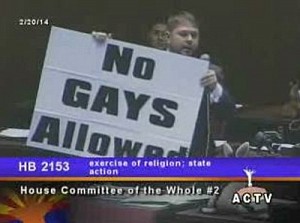 “License to discriminate” laws, which would allow a company to refuse service to GLBT customers on religious grounds, are being debated in many state capitals, and a few states, notably Arizona, have walked back from the brink of enacting such a law. These bills are so vaguely worded that people seem to have figured out that basically they would allow a vendor to refuse service to anyone they don’t happen to like for “religious” reasons. Supporters of these laws frame the debate as a matter of individual rights and the free market. But then, with an almost imperceptible sleight of hand, they’re suddenly talking not about an individual but about a collective body. “Corporations are people, my friend!” exclaimed Mitt Romney during the 2012 campaign. That may be true in some post-Citizens United sense, but there’s a vast body of law establishing that a company such as a restaurant is a “public accommodation” which, unlike a private person, can’t refuse service to minorities. But take heart, Mitt! There are lots of things a corporation can do that a person can’t, such as buying and selling one another, for starters. But a corporation cannot vote or drive a car or hold opinions about the worthiness of customers according to their demographic characteristics.
“License to discriminate” laws, which would allow a company to refuse service to GLBT customers on religious grounds, are being debated in many state capitals, and a few states, notably Arizona, have walked back from the brink of enacting such a law. These bills are so vaguely worded that people seem to have figured out that basically they would allow a vendor to refuse service to anyone they don’t happen to like for “religious” reasons. Supporters of these laws frame the debate as a matter of individual rights and the free market. But then, with an almost imperceptible sleight of hand, they’re suddenly talking not about an individual but about a collective body. “Corporations are people, my friend!” exclaimed Mitt Romney during the 2012 campaign. That may be true in some post-Citizens United sense, but there’s a vast body of law establishing that a company such as a restaurant is a “public accommodation” which, unlike a private person, can’t refuse service to minorities. But take heart, Mitt! There are lots of things a corporation can do that a person can’t, such as buying and selling one another, for starters. But a corporation cannot vote or drive a car or hold opinions about the worthiness of customers according to their demographic characteristics.






Discussion1 Comment
Thank you for acknowledging the “public accommodation” factor in this topic. The Press can’t be bothered to do their homework, but it is an absolutely critical consideration. A public accommodation designation comes with both costs and benefits to the organization. If they want to exercise the rights of an individual, they can be a private organization and legally practice discrimination and bigotry in all kinds of ways. And many such organizations exist all over the country. BUT, they loose the benefits of being a public accommodation. Likewise, public corporations have huge tax benefits, but they do loose a couple grains of control. They do, however, always have the choice of not being a public organization, but a private one with specific services and benefits to its members. So, if a company doesn’t want to follow the law of public commerce, they can be a private organization. That is their choice, not which laws of public commerce and labor they can choose to ignore.